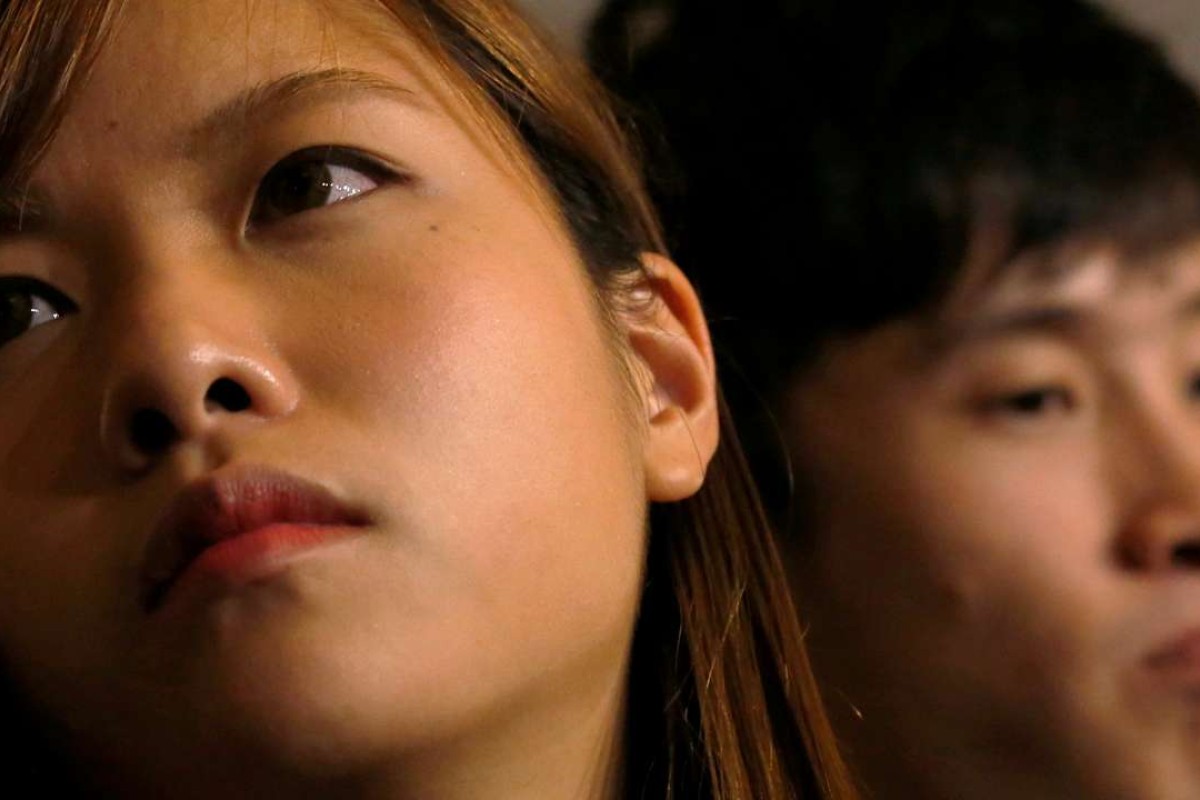 Pro-independence activists Yau Wai-ching (L) and Baggio Leung outside the High Court after the court disqualified them from taking office as lawmakers in Hong Kong, China November 15, 2016. Photo: Reuters
Pro-independence activists Yau Wai-ching (L) and Baggio Leung outside the High Court after the court disqualified them from taking office as lawmakers in Hong Kong, China November 15, 2016. Photo: Reuters[UPDATE – Wednesday, November 30, 3pm]
Outside the High Court in Admiralty at around 2pm, Baggio Leung said they respected but disagreed with the Court of Appeal’s ruling. “We heard the interpretation of the Basic Law in the verdict seven times. It means Beijing has violently intervened in Hong Kong’s internal affairs,” he said.
Baggio Leung said they’ve already written the letter to the Court of Appeal. The letter stated the duo reserved the right to appeal. “It will take us some time to study the ruling with our legal team. We’ll also look at other solid counterarguments before appealing to the Court of Final Appeal.”
Asked if they had sufficient financial resources to launch the appeal, Baggio Leung said: “My legal team estimated we needed to pay at least HK$1 million in cash for the deposit. At this stage, we don’t have any figures.” Yau said they already had more than HK$300,000, and hoped they had enough time to raise the money.
Asked if their appeal would initiate another interpretation of the Basic Law, the duo said it was not in their control. But Baggio Leung insisted they hadn’t done anything wrong, so they would not apologise.
[Wednesday, November 30, 11.30am]
The appeals court in Hong Kong today ruled in favour of the government in its unprecedented legal bid against the legislature, upholding a lower court’s ruling to disqualify two localist lawmakers.
The Court of Appeal’s ruling in the controversial oath-taking case is unlikely to be final, as even the judges expect Sixtus Baggio Leung Chung-hang and Yau Wai-ching will seek to bring the case to the Court of Final Appeal.
Indeed, they have reserved a slot on Thursday to hear the party’s application for leave to appeal.
The case centres on whether pro-independence lawmakers Baggio Leung and Yau should be disqualified over their anti-China antics during the oath-taking ceremony on October 12. They used allegedly derogatory language in swearing allegiance to Hong Kong as part of China and laid out a banner saying Hong Kong is not China.
The ruling is a political victory for both the Hong Kong and Beijing governments, who have stepped up their rhetoric against advocates for Hong Kong independence since the pair were elected in September.
In a press summary from the court on Wednesday, it reaffirmed the lower court’s ruling: “When a constitutional requirement in Basic Law is in issue, the common law doctrine of separation of powers and non-intervention must give way to the court’s constitutional duty to apply the Basic Law.”
It added the immunity of lawmakers from lawsuits did not “extend to cover Legco member’s taking of the Legco oath when assuming office”.
The Court of Appeal ruling will also have implications for future cases, including one against another lawmaker Lau Siu-lai, which the Department of Justice intended to file after this ruling. It has become a binding judgement for the Court of First Instance to follow when it adjudicates a string of other cases already launched by citizens against a score of pan-democratic and pro-establishment lawmakers.
The court ruled that “there is no question of allowing them to retake the oath as a matter of law”.
Solicitor Jonathan Man Ho-ching, who represented Baggio Leung, said he would discuss with his client about whether to appeal the decision at the Court of Final Appeal.
The court ruled the duo’s seats were “automatically vacated”, though details of a run-off election were unlikely to be announced before the top court has a final judgement.
The Court of First Instance earlier disqualified the pair, finding them to have “declined” to take the oath faithfully. At the appeal hearing last week, High Court chief judge Andrew Cheung Kui-nung pushed the parties to address Beijing’s ruling on oath-taking.
The National People’s Congress Standing Committee made a ruling before the lower court’s judgment, saying the relevant Basic Law article required an oath-taker to be “sincere” and “solemn”. Non-compliance would mean immediate disqualification, it ruled.
Despite Mr Justice Cheung’s suggestion, neither the localists nor the government focused their arguments on the interpretation.
Leung’s lawyer, Hectar Pun SC, made a U-turn and gave up his argument that the Beijing ruling went beyond the scope and amounted to “legislating” rather than “interpreting” the law, after the judge asked for mainland law experts to support his claim.
Commenting of the argument that the interpretation went as far as to amounting an amendment, the justices wrote on Wednesday: “The court does not have jurisdiction under the Basic Law to entertain the argument that interpretation is ... a purported amendment of the Basic Law.”
They ruled that the interpretation was binding.
Philip Dykes SC, for Yau, did not want to go into the intricacies of the interpretation, maintaining his position that the court, under the principles of separation of powers and non-intervention, should refrain from stepping into what he called an internal affair of the legislature.
Benjamin Yu SC, for the government, said the Beijing ruling was binding on local courts and should be adopted to disqualify the pair immediately. He earlier used common law principles to argue that the duo had indeed “declined” to take the oath under local legislation.
